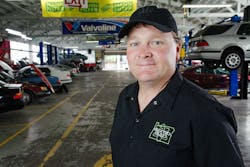Over the past decade, numbers have shown increasingly growing hybrid vehicle sales, making one thing for certain: Hybrids are no longer a fad— they represent a viable market share that shops should take advantage of.
According to the U.S. Department of Energy’s Alternative Fuels Data Center, U.S. hybrid sales have risen from 0.1 percent of total vehicle sales in 1999 to 3.8 percent in 2013. And a 2014 study from the University of Michigan Transportation Research Institute (which interviewed 1,000 hybrid owners and 1,000 conventional vehicle drivers) reported one-third of non-hybrid respondents plan to purchase a hybrid as their next vehicle, and 83 percent of hybrid owners plan to buy another.
Despite the growing presence of hybrids, there are still few shops that offer hybrid repairs as a specialty. So as more and more shops begin to tap into this growing market, branding your hybrid expertise becomes essential.
Whether hybrids account for 95 percent of your business—like Carolyn Coquillette’s $2 million operation, Luscious Garage in San Francisco—or you’re looking to increase your current hybrid output—like Travis Decker, owner of the 22-bay Atomic Auto in Portland—branding your shop for hybrid owners is an art form that requires time and dedication.
KNOW YOUR MARKET
When Coquillette opened Luscious Garage in 2007, she says hybrid owners were a different breed than they are today.
“Originally, hybrid owners were super progressive and anti-Bush. They wanted to drive the most technically advanced car on the road,” she says. “In 2015, that’s all out the window. People drive the Prius because it’s cheap and practical.”
Because the hybrid market is so substantial in Portland, Decker plans on making hybrids the majority of his workload, hoping to increase it from the current 15–50 percent of his output in the next few years. Decker believes in his plan because he did the research: According to Cars.com, Portland had the third-highest percentage of hybrid inquiries in 2010. And according to PriusChat, Oregon has the third-highest citizen-to- Prius ratio, behind only Vermont and California and just ahead of Washington and New Hampshire.
Not everyone is lucky enough to have such a high concentration of hybrid vehicles in their market, but there still may be potential—study your region’s demographics and compare it to your own customer database and find out if there’s a viable opportunity for adding a hybrid specialty to your shop. Websites (like City-Data.com) can provide important information regarding demographics in your region.
Some key stats about hybrid owners from the University of Michigan study:
• Eighty-six percent noted “environmental impact,” “saving money” and “using less energy” as reasons for buying hybrids
• Eighty percent of owners are over the age of 50
• Almost half have $100,000 yearly household incomes
• Women make up 80 percent
• Ninety-six percent of owners have college educations
You can also use online resources, such as the Cars.com study (bit.ly/rwhybrids) and Prius data (bit.ly/rwprius), to determine if marketing to hybrid owners is worth the time and resources. While West Coast and Northeastern cities dominate the hybrid market—including San Francisco; Seattle; Charlottesville, Va.; and Boston—and Southeastern states present the least opportunities, there are a surprising number of markets near the top in Montana, Minnesota, Alaska and Wisconsin. Decker recommends contacting your state transportation department as well for vehicle statistics in your area.
BRAND YOUR EXPERTISE
While many owners note environmental reasons for buying hybrids, Coquillette says customers visit her shop for two reasons: price and expertise. Because few shops specialize in hybrids, customers don’t always know what to expect from a shop advertising its hybrid expertise. And since the alternative is an expensive bill from the dealership, they’re willing to research independent shops. Explaining the costs, the repair process and why your technicians are qualified to operate on a hybrid is essential in landing business.
“You don’t win customers by responding to reviews on Yelp,” Coquillette says. “Your strategy should be how you treat people when they’re in the shop. The goal is to make the experience every person has so fantastic that they’ll want to go again.”
Decker and Coquillette execute various branding strategies for informing customers about their specialized repairs.
To understand hybrids inside and out, Decker didn’t just attend training— he bought himself a hybrid. And because he drives one every day, he knows how to interact with his clientele, and trains his staff to utilize unique tidbits of hybrid knowledge.
“On early [Toyota] Prius models, when you put it in reverse, the car beeps. It’s obnoxious,” he says. “So when people call for oil change, we ask, ‘Do you want us to turn that off for you?’ Little things like that demonstrate expertise and knowledge of the product.”
Coquillette and Decker attract potential customers through a combination of traditional advertising and grassroots marketing—selling their unique services helps obtain work and creates word-of-mouth publicity.
Coquillette says advertising on NPR provides her shop with tons of publicity, and hosting nonprofit benefits at her shop reaches her targeted market. Decker practices the same tactics, and even takes out newspaper advertisements. Whatever the approach, both owners advertise that not only can they fix your hybrid, but they can do it cheaper than the dealership.
“A lot of people think the dealership is the only place that can repair their hybrid,” Coquillette says. “If their headlights are out, it’ll cost $800 at a dealership to get them replaced. But if they just see that we do hybrid repairs and call us up, they’ll find out it’s $100 and they’ll be right over.”
Both Decker and Coquillette execute a unique strategy for finding customers: Going right up to parked hybrid vehicles and leaving business cards labeled with a phone number, an address and the words “hybrid repair” in the driver’s window. They say it’s a passive yet deliberate method of marketing that is attractive to customers.
“If every car in the parking lot has a flyer on it, you won’t care,” Coquillette says. “But if you’re one car in the garage that has been the one left this note, it really feels like a person who cares left it there. It instantly becomes way more personal.”
IMPROVE YOUR SEO
Coquillette has improved her search engine optimization (SEO) by posting videos and blog entries about common repair problems hybrid owners face. She created a blog that features tips for simple car repairs (replacing dash lights, checking oil), essential reading for hybrid owners (the “best tires” for the second generation Prius), and videos that highlight repairs her shop specializes in, like Prius battery failure.
“Imagine you’re the owner of a car that has a problem and you’re going to Google—what are you searching?” she asks. “You wouldn’t search ‘San Francisco hybrid repair.’ You’d search ‘Prius battery failure.’”
If you do type “Prius battery failure” in Google’s video search, Luscious Garage shows up as the second result— and the video has been viewed over 100,000 times. Populating both the Luscious Garage YouTube page and blog with typical hybrid problems has been key in raising her SEO and getting phone calls and walk-ins.
Coquillette’s strategy in finding key terms hybrid owners search for lies in scouring the Internet for tips. When you start to type in Google’s search bar, it will automatically populate more words based on what most people are searching. Most often, she says hybrid owners are searching about headlight bulbs, tires, water pumps, and battery failure.
“OK, there’s a problem that happens on Priuses when the dashboard goes dark. How do you describe that?” she asks. “‘Dash lights out,’ ‘dead dashboard,’ ‘no lights.’ What are the keywords? What is someone trying to describe?”
Coquillette used this tactic when searching “hybrid battery repairs.” Google suggested “P0A80 replace” as a search term, and now Luscious Garage’s blog posts about replacement options for hybrid models with a P0A80 battery show up as the first and second results.
She suggests keeping the blogs and videos short and straight to the point. You’re not offering advice to DIYers— you’re showing off your hybrid knowledge to your clientele.
Coquillette also regularly visits PriusChat.com and the hybrid section of Reddit.com, offering advice on hybrid repairs, which has brought in a surprising number of new customers.
“People will travel a couple townships over if you’re offering the kind of expertise nobody in their area can offer,” she says.

